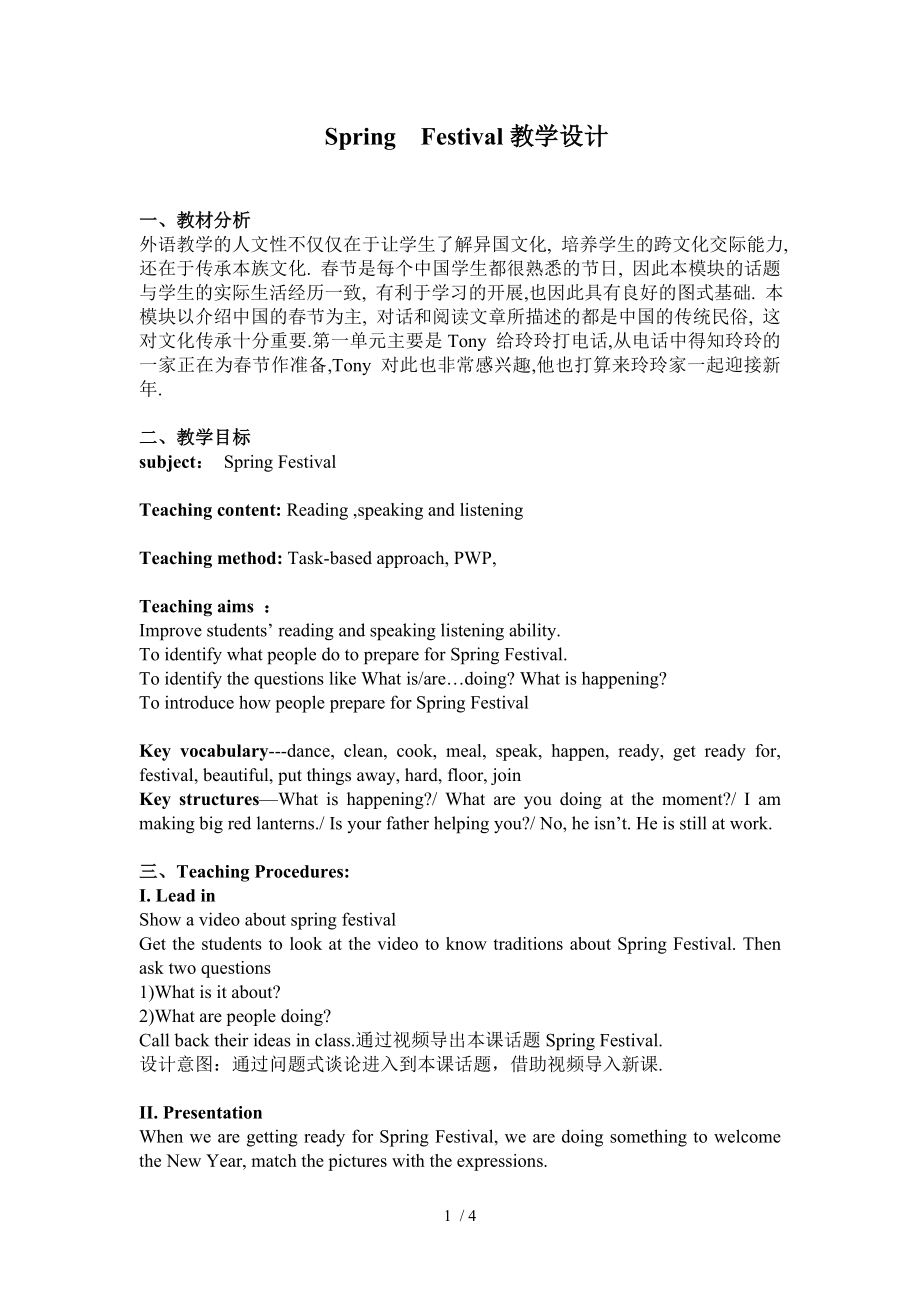《外研版七年級(jí)英語(yǔ)上冊(cè)Module 10 unit1 Are you getting ready for Spring Festival.教案》由會(huì)員分享���,可在線閱讀,更多相關(guān)《外研版七年級(jí)英語(yǔ)上冊(cè)Module 10 unit1 Are you getting ready for Spring Festival.教案(4頁(yè)珍藏版)》請(qǐng)?jiān)谘b配圖網(wǎng)上搜索��。
1�、Spring Festival教學(xué)設(shè)計(jì)
一��、教材分析
外語(yǔ)教學(xué)的人文性不僅僅在于讓學(xué)生了解異國(guó)文化, 培養(yǎng)學(xué)生的跨文化交際能力, 還在于傳承本族文化. 春節(jié)是每個(gè)中國(guó)學(xué)生都很熟悉的節(jié)日, 因此本模塊的話題與學(xué)生的實(shí)際生活經(jīng)歷一致, 有利于學(xué)習(xí)的開(kāi)展,也因此具有良好的圖式基礎(chǔ). 本模塊以介紹中國(guó)的春節(jié)為主, 對(duì)話和閱讀文章所描述的都是中國(guó)的傳統(tǒng)民俗, 這對(duì)文化傳承十分重要.第一單元主要是Tony 給玲玲打電話,從電話中得知玲玲的一家正在為春節(jié)作準(zhǔn)備,Tony 對(duì)此也非常感興趣,他也打算來(lái)玲玲家一起迎接新年.
2、二����、教學(xué)目標(biāo)
subject: Spring Festival
Teaching content: Reading ,speaking and listening
Teaching method: Task-based approach, PWP,
Teaching aims :
Improve students’ reading and speaking listening ability.
To identify what people do to prepare for Spring Festival.
To identify the questions l
3����、ike What is/are…doing? What is happening?
To introduce how people prepare for Spring Festival
Key vocabulary---dance, clean, cook, meal, speak, happen, ready, get ready for, festival, beautiful, put things away, hard, floor, join
Key structures—What is happening?/ What are you doing at the mome
4����、nt?/ I am making big red lanterns./ Is your father helping you?/ No, he isn’t. He is still at work.
三、Teaching Procedures:
I. Lead in
Show a video about spring festival
Get the students to look at the video to know traditions about Spring Festival. Then ask two questions
1)What is
5���、it about?
2)What are people doing?
Call back their ideas in class.通過(guò)視頻導(dǎo)出本課話題Spring Festival.
設(shè)計(jì)意圖:通過(guò)問(wèn)題式談?wù)撨M(jìn)入到本課話題,借助視頻導(dǎo)入新課.
II. Presentation
When we are getting ready for Spring Festival, we are doing something to welcome the New Year, match the pictures with the expressions.
設(shè)計(jì)意圖:本活動(dòng)為圖式激活活
6��、動(dòng), 激活的既有語(yǔ)言圖式,也有內(nèi)容圖式.圖片可以把學(xué)生帶入春節(jié)的情景, 有助于激發(fā)學(xué)生的興趣, 也為詞匯的學(xué)習(xí)作準(zhǔn)備. 然后使用這些詞組來(lái)講授現(xiàn)在進(jìn)行時(shí)的一般疑問(wèn)句及肯定回答和否定回答.在這個(gè)環(huán)節(jié)中使用點(diǎn)讀筆糾正發(fā)音,使學(xué)生養(yǎng)成良好的發(fā)音習(xí)慣.
III. Listening
We are going to hear a conversation between Tony and Lingling, listen to the conversation and answer two questions.
1) What is Tony doing?
2) What are Lingl
7、ing and her family doing?
Then listen to the passage again and answer another two questions
1) Is Lingling’s father helping her?
2) Are Daming and Betting learning a dragon dance?
設(shè)計(jì)意圖:在這個(gè)環(huán)節(jié)讓學(xué)生帶著問(wèn)題去聽(tīng)�, 有目的的聽(tīng)可以培養(yǎng)學(xué)生的聽(tīng)力能力.同時(shí)這兩個(gè)題目的設(shè)置也有兩個(gè)作用,一是與本課的話題有關(guān),二是與本課要講的語(yǔ)法有關(guān),即現(xiàn)在進(jìn)行時(shí)的一般疑問(wèn)句及肯定回答和否定回答.
IV. Readi
8、ng
Step1. Read the passage by yourself, and then finish the exercise.
設(shè)計(jì)意圖:帶著問(wèn)題細(xì)讀文章���,讓學(xué)生了解更多本段內(nèi)容.同時(shí)練習(xí)現(xiàn)在進(jìn)行時(shí)的一般疑問(wèn)句及肯定回答和否定回答。
Step2. Mind Map
In China Spring Festival is a traditional festival, everybody is quite busy now. In Ling ling’s family, Lingling is making lanterns.
Is her father h
9���、elping her? ---- No , he isn’t. He is still at work.
What is her mother doing?--- She is cleaning the house and putting things away.
What about her aunt?--- She is sweeping the floor.
Is her grandma sweeping the floor?--- She is cooking the meal.
Who is learning a dragon dance? ----- Daming
10、 and Betty
.
設(shè)計(jì)意圖:借助思維導(dǎo)圖����,幫學(xué)生搭建框架,給學(xué)生足夠的時(shí)間討論春節(jié)習(xí)俗���,讓學(xué)生練習(xí)表達(dá)�����,讓 學(xué)生能對(duì)所學(xué)知識(shí)做到更好的輸出。
Step3 Deep understanding
This time let’s look at the character”chun”again, then ask the students some deep understanding questions.
1). During the spring festival, Lingling’s father is till at work. What can you l
11�、ean from this sentence.
Answer: During the Spring Festival not all the people are on holiday, when we are getting ready for Spring Festival, some people are still working.
2). Her mother is sweeping the floor and putting things away.
3). What will happen at the end of the dialogue?
4). Are the
12�����、y having a good time?
Sum up: We can say in China, Spring Festival is the most important festival; all the people will get together to celebrate it. Although they are quite busy, they are having a good time. So Spring Festival means reunion and happiness.
設(shè)計(jì)意圖:閱讀的深層次理解問(wèn)題可以加深學(xué)生對(duì)課文的理解,在這里我提出了四個(gè)問(wèn)題,第一
13�����、個(gè)問(wèn)題是讓學(xué)生了解到當(dāng)我們放假在為春節(jié)做準(zhǔn)備時(shí)還有一些人仍然在工作.比如部分警察和醫(yī)生等��。 第二個(gè)問(wèn)題讓學(xué)生學(xué)會(huì)感恩�,通過(guò)玲玲的媽媽一直在忙碌著這件事情推出所有的父母都是這么辛苦操勞著����,所以我們做兒女的應(yīng)該盡可能的幫助父母做一些力所能及的事情, 減輕父母的負(fù)擔(dān)����。第三個(gè)問(wèn)題是培養(yǎng)學(xué)生推測(cè)的能力���, 能根據(jù)課文的內(nèi)容學(xué)會(huì)分析和邏輯推理。最后一個(gè)問(wèn)題是讓學(xué)生的全文有一個(gè)整體感知的畫(huà)面感�����, 雖然大家都在為春節(jié)而忙碌著但是大家都很高興��。因?yàn)榇汗?jié)就意味著團(tuán)圓和快樂(lè)����。
Step4. Do some exercise to check if the students understand the passag
14���、e very well.
設(shè)計(jì)意圖: 本活動(dòng)為詞匯應(yīng)用活動(dòng), 要求學(xué)生在理解語(yǔ)篇的基礎(chǔ)上選擇單詞或詞組的適當(dāng)形式填空.語(yǔ)篇描述的內(nèi)容是春節(jié)前的活動(dòng), 與閱讀相關(guān).
V. Speaking
Step 1微課
我們已經(jīng)知道玲玲的家人正在為春節(jié)做準(zhǔn)備�����,而我們的外教也對(duì)中國(guó)的春節(jié)非常感興趣, 今天的假期他打算在中國(guó)過(guò)新年��, 但是他對(duì)中國(guó)的習(xí)俗還不是特別了解�, 所以請(qǐng)我們大家再給他做一下詳細(xì)的介紹�, 下面請(qǐng)看我們的微課視頻����。
Step 2 performance
通過(guò)視頻我們知道我們的外教想在中國(guó)過(guò)年�����, 你想邀請(qǐng)他或者是你的其他朋友來(lái)家里做客嗎���?下面我就給大家?guī)追昼姷臅r(shí)間準(zhǔn)備一下
15、��。Give the ss some time to act out the dialogue
設(shè)計(jì)意圖:給學(xué)生提供展示自我的舞臺(tái)�,讓學(xué)生所學(xué)所用��,達(dá)到學(xué)以致用的目的���。同時(shí)學(xué)生自備服裝道具����, 自編劇本,鍛煉了他們的團(tuán)結(jié)合作的能力�。
Step3 Sum up
Sum up what we have learned this lesson.
Find two students to sum up what we have learned.
VI. Homework
設(shè)計(jì)意圖:讓學(xué)生更深入了解中國(guó)春節(jié)的文化.同時(shí)明白圣誕節(jié)就是外國(guó)人的春節(jié)�,和咱們的春節(jié)沒(méi)什么不同��,關(guān)鍵在于人們的
16�����、生活理念發(fā)生了變化�,對(duì)美好生活的追求是每個(gè)人的理想�,不管圣誕還是春節(jié),祝福人們都能過(guò)得好��,愛(ài)所到之處����,幸福就會(huì)伴隨在哪里���。
四. 教學(xué)反思
這節(jié)課所學(xué)內(nèi)容貼近生活,貼近實(shí)際��,學(xué)生對(duì)于春節(jié)都有所了解����,通過(guò)聽(tīng)力感知��,到對(duì)話中理解�����,到實(shí)際應(yīng)用��,學(xué)生能夠正確的掌握并使用現(xiàn)在進(jìn)行時(shí)的一般疑問(wèn)句和特殊疑問(wèn)句. 在授課活動(dòng)中,通過(guò)師生互動(dòng)��,生生互動(dòng)和小組合作����,提高了學(xué)習(xí)效率��,和學(xué)習(xí)興趣���。尤其是最后的深層次理解和表演環(huán)節(jié),學(xué)生參與積極性高���,并能在表演中體會(huì)語(yǔ)音語(yǔ)調(diào)和重音在日常交流中表達(dá)情感的作用���。同時(shí)也通過(guò)展示,使學(xué)生體會(huì)到了學(xué)習(xí)的樂(lè)趣�����,實(shí)現(xiàn)了英語(yǔ)學(xué)習(xí)的工具性和人文性的特征����。
4 / 4
 外研版七年級(jí)英語(yǔ)上冊(cè)Module 10 unit1 Are you getting ready for Spring Festival.教案
外研版七年級(jí)英語(yǔ)上冊(cè)Module 10 unit1 Are you getting ready for Spring Festival.教案

